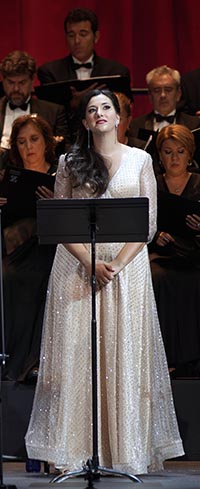.jpg) |
La Celestina lyric tragicomedy in four acts Music and libretto: Felip Pedrell Teatro de la Zarzuela (Madrid, 9 and 11 September, 2022) reviewed by Miccone |
In his account of ‘La Marseillaise’ from Decisive Moments in History, Stefan Zweig reminds us that ‘In the long run, the innate energy of a work cannot be hidden or ignored. A work of art may be forgotten by time, it may be banned or rejected, but the essential always wins out over the ephemeral’. Indeed, there are always reasons to help us to understand why a work may have been forgotten, from the most blatant political censorship, to aesthetic and/or social conditions. In the world of opera – for decades, thanks to the interest of various cultural bodies including some commendably conscientious record labels – ‘heritage revival’ has ended up being imposed as one of the inescapable tasks for orchestras and theatres. Such revivals commit significant sums of money, and that (naturally) implies a margin of risk or error.
 Since last season, and despite the success of La tempestad (Chapí), María del Pilar (Giménez) and Las Calatravas (Luna), the Teatro de la Zarzuela has staked its cycle of concert version revivals on a single card: the ‘national operas’ of the late 19th and early 20th centuries. In my previous reviews of Circe (Chapí) and Tabaré (Bretón) I warned against looking for lost treasures in these megalomaniacal, snobby ‘grand’ operas; there is more poetry and ‘essential’ art in the romanza of El barquillero or the soleá of La verbena de la Paloma than in all of Circe or Tabaré. In the case of Pedrell, a musician of limited stage experience, shipwreck was predictable; and with the premiere of his unpublished Celestina our fears have been confirmed – this is a soporific and anti-theatrical work. It is a score whose orthopaedic prosody ends up being unbearable, and in which I find flashes of sound craftsmanship only in the instrumentation, some undeniably showy choral passages, and in the thematic-rhythmic delineation of the central character of the bawd herself.
Since last season, and despite the success of La tempestad (Chapí), María del Pilar (Giménez) and Las Calatravas (Luna), the Teatro de la Zarzuela has staked its cycle of concert version revivals on a single card: the ‘national operas’ of the late 19th and early 20th centuries. In my previous reviews of Circe (Chapí) and Tabaré (Bretón) I warned against looking for lost treasures in these megalomaniacal, snobby ‘grand’ operas; there is more poetry and ‘essential’ art in the romanza of El barquillero or the soleá of La verbena de la Paloma than in all of Circe or Tabaré. In the case of Pedrell, a musician of limited stage experience, shipwreck was predictable; and with the premiere of his unpublished Celestina our fears have been confirmed – this is a soporific and anti-theatrical work. It is a score whose orthopaedic prosody ends up being unbearable, and in which I find flashes of sound craftsmanship only in the instrumentation, some undeniably showy choral passages, and in the thematic-rhythmic delineation of the central character of the bawd herself.
Pedrell fails to condense Rojas’s work into a consistent operatic text (including some laughably spurious verbal archaisms of his own invention) and his score definitely does not propel a drama whose original is so powerful and attractive. So those of us who were hoping to discover a ‘Spanish-style’ Tristan, contemporary to Tosca, Salome or Pelléas, had to settle for a third anaesthetic pill of ‘national opera’. Emilio Casares’ homily on the theatre’s Youtube channel informs us that we are about to hear ‘the best of our operatic history’, an assertion which makes us shudder, recalling the revivals of works with genuine ‘innate energy’ (to return to Zweig’s concept) such as El juramento, Curro Vargas or Las bribonas. Following their ‘fake revivals’ (since no stage production is envisaged and the works have not even been recorded), these bad operas by Chapí, Pedrell and Bretón will once again sleep the sleep of the just – a lethargy they themselves provoke – surely never to wake again.
.jpg)
The post-mortem of La Celestina has been made possible thanks to the work of ICCMU and to the work – outstanding, no doubt – of the editor David Ferreiro Carballo. Pedrell’s score is very extensive so, as in the case of Circe and Tabaré, it was presented in very mutilated form. The conductor Guillermo García Calvo’s reading was measured, necessarily restrained, so that the singers were able to pick their way through a musical text which, in its enormous complexity, could not be internalised. Thus, only Miren Urbieta-Vega’s committed work as Melibea stood out, with tenor Andeka Gorrotxategui again losing his voice – as he had in Tabaré. Maite Beaumont took on the role of Celestina, which she had to learn in barely two weeks, following after the defection of Ketevan Kemoklidze. The best of the evening, in my opinion, was the contribution of Teatro de la Zarzuela’s resident chorus, directed by Antonio Fauró, at last performing in its full strength after the restrictions imposed by Covid.
© Miccone and zarzuela.net, 2022
Cast: Maite Beaumont (Celestina), Miren Urbieta-Vega (Melibea), Andeka Gorrotxategui (Calisto), Juan Jesús Rodríguez (Sempronio), Simón Orfila (Parmeno), Sofía Esparza (Lucrecia), Lucía Tavira (Elicia), Gemma Coma-Alabert (Areúsa), Javier Castañeda (Pleberio), Mar Esteve (Tristán), Isaac Galán (Sosia). Coro Titular del Teatro de la Zarzuela, Orquesta de la Comunidad de Madrid, c. Guillermo García Calvo |
 |
![]() en español
en español
![]() Celestina, Scene V (YouTube)
Celestina, Scene V (YouTube)![]() portada de zarzuela.net
portada de zarzuela.net
13/IX/2022